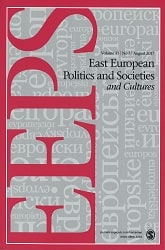Laughter and Hatred Are Neighbors: Adolf Hoffmeister and E.F. Burian in Stalinist Czechoslovakia, 1948-1956
Laughter and Hatred Are Neighbors: Adolf Hoffmeister and E.F. Burian in Stalinist Czechoslovakia, 1948-1956
Author(s): Shawn ClyborSubject(s): Cultural history, Political history, Government/Political systems, Politics and society, WW II and following years (1940 - 1949), Post-War period (1950 - 1989), History of Communism
Published by: SAGE Publications Ltd
Keywords: avant-garde; communism; cultural politics; Czechoslovakia; socialist realism;
Summary/Abstract: This article considers how Adolf Hoffmeister and E.F. Burian, influential members of the interwar avant-garde, struggled to define themselves as socialist realists in Czechoslovakia 1948-1956, even as they engaged in a parallel struggle to create works consistent with their artistic legacy. It argues that their ideas emerged both in cooperation with and in opposition to the increasingly repressive post-1948 communist regime, whose broader ideals they enthusiastically shared. Using these two intellectuals as case studies, the goal is thus to reframe our understanding of “complicity” under the 1950s Stalinist regime as a complex series of responses to the political, social, and intellectual questions of the era. Neither vacuous mouthpieces of the regime nor political dissidents, Hoffmeister and Burian stood at a critical historical juncture that linked the legacy of the interwar avant-garde to the cultural flowering of the 1960s Prague Spring. The article comprises three sections: The first offers a brief overview of the Stalinist era in Czechoslovakia, taking into account recent historical scholarship that recasts our understanding of the period. The second section examines the art and politics of Adolf Hoffmeister, who played a key role in the Stalinization of the Czechoslovak Fine Arts Union in 1952, revealing his attempts to both criticize and employ the violent rhetoric of the communist Terror. The third section considers E.F. Burian’s desperate attempt to save his interwar Theater D from nationalization, which ironically forced him into a relationship with the Ministry of Defense under the arch-Stalinist Alexej Čepička.
Journal: East European Politics and Societies
- Issue Year: 26/2012
- Issue No: 03
- Page Range: 589-615
- Page Count: 27
- Language: English
- Content File-PDF

